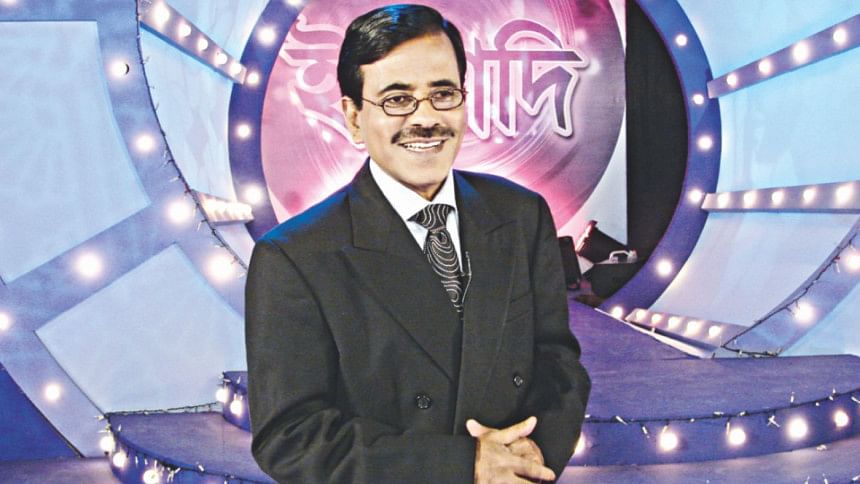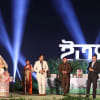30 year Journey

How did the idea of 'Ittadi' click in your head?
I am a person with persistence for my work. Multitasking is not my cup of tea. I give my full concentration to one work at a time. The concept of Ittadi was not triggered by any obvious idea and the stature that it has set foot on now, is nothing but the consequence of my 30 years of unwavering commitment to it.
The project of staging and shooting the programs in the off-the-map regions was initiated by you. What made you think of executing the show in these secluded parts of the country?
I wanted Ittadi to be a multipurpose and people-oriented program in the truest sense. There was a time when our programs were confined to the threshold of four walls of studios, and people, at one point of time got exhausted of those repetitive schemes where the shows and their contents were very identical to each other. We, as a team have endeavoured to come out of that boundary and draw the attention of the world to our history, tradition, ancient and archeological vestiges of millions of civilizations and what not. The objective of the project was to blazon and retain the scenic beauty and historical significance of these places and enlighten a bigger population about them. I believe, having insight into own root is just another way of knowing yourself.
‘Ittadi', involved a number of local artists and they have wonderfully performed in every scheme of the show. How did you even make it happen?
After having selected the location, we invest ample time in research and groundwork about that place, their people, their culture and their uniqueness. Then, we get acquainted with the local people and thus they are incorporated in our projects. We make them rehearse for days and through multiple practice sessions, the not-so-skilled local people adapt to the manners of stage. In the larger scheme of things, Ittadi leaves an inevitable influence on the people and culture of those regions. Their indigenous people warmly accept our efforts and the songs or other forms of artwork we create for them. In fact, a number of times, when we make a song composed on the basis of their root culture, habits, customs, characteristics and many other aspects of their life, they embrace it as their theme song.
'Ittadi' focuses its attention on people of different classes, ages and professions. Is this how the show reached its success?
Ittadi accentuates on the heart and root of our culture instead of being the spokesman for a particular group of people. Even when there was no single satellite channel in the entire country, we went from place to place, from different outlying places to urban regions and built up our episodes. And yes, if I'm accountable to people of some specific profession, they would undeniably be all the labouring men of our country- the farmers, fishermen, weavers and forgers and who not, because our civilizations and everything that we brag about today, are constructed with their diligence and sacrifices.
What is anchoring actually to you?
I believe this is just another form of absolute art. An anchor is expected to indulge himself in everything associated with the show- from program-planning to execution. He must have flamboyance in his personality because the whole show will be convoluted by the host.
We all know, 'Ittadi' had undertaken a number of exceptional projects to initiate and extend education in the dim and distant regions of the country. Is there any progress thus far?
Ittadi, in its 30 year old journey, has prioritized education over all other aspects and has given platform to quite a few number of institutions, educationists and enlightened personalities in the show in order to broaden people's horizons on education. Even the show has expanded its hand for financial help as well with which some bought new land and built up school, some bought benches, chairs, tables and some have developed the infrastructure of their institution.
When men like Gauher Ali, Palan Sarkar, Jaydev Dutta whom Ittadi had introduced to the audience and brought a platform get national awards, how do you feel?
The feeling is unmatched! Though it may seem strange, these people are least bothered about any appreciation or acknowledgement for their work. Men like Gauhar Ali have the sense of accountability towards his people very spontaneously, they do not require any award to succumb to that sudden realization.
Hanif Sanket is not just a brand name, it itself is an institution. You have gradually thrived and brought yourself to a level where you are alone your competitor. What do you say about this?
I have never done anything in life for compliments and recognition. My whole agenda of coming up with a new episode of Ittadi arises from a sense of obligation and responsibility. I can easily solicit dignified artists and critics to my program and let them inundate me in an ocean of sugarcoated statements about my show and me. The actual fact lies in somewhere else, in the hearts of my audience. The praises I get from them are the purest and I accept only authenticity in my life. I cater the love of my audience to my every whim.
Our television channels are losing their audience with every passing day. What do you think, where is the problem?
The issue lies in the idea of making economic profits. Business and taste of art are two things of different worlds. If business takes up the possession of creativity and proclivity for artwork, one cannot expect the contents telecast on media to be leading-edge and innovative. These days, from the channel authorities to the artists, everyone is out and out bothered about making profits from the production thus the most requisite elements and characteristics of the culture are lost in the crowd.
People have warmly accepted you even as a writer. Why are you not being regular in this sketch?
Ittadi is an extremely elaborate program. For the last 30 years, I have successively maintained the schedules, hence it was virtually impossible for me to write something on a regular basis. But I definitely find every scope of writing whenever I get time from the routine. I embarked on my media journey with writing. Maybe that is what keeps me going till now and come what may; I try my level best that I have at least a book in every book fair.
Our audience has always taken interest in knowing about your personal life. How is Hanif Sanket as a person, out of the glamorous world of showbiz?
Even out of the light of media, I am involved with some social activities. That is my breathing space and I do not want to do it ostensibly. As for my personal life, let it remain personal. People that love me should love me for my work. I want to live and retain my existence within my works.
By Sharbani Datta

 For all latest news, follow The Daily Star's Google News channel.
For all latest news, follow The Daily Star's Google News channel. 








Comments